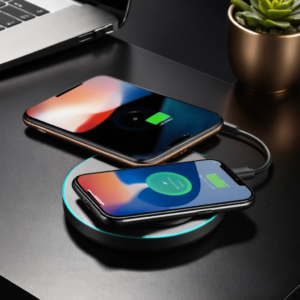Wondering if a power bank or a wall charger charges your device faster? We compare both options, explaining speed, efficiency, and the best use cases.
🔄 Introduction
Ever been stuck with a dying phone and wondered, should I plug into a wall charger or grab my power bank? Well, you’re not alone! In today’s fast-paced world, charging speed matters more than ever—whether you’re at home, commuting, or traveling.
So, which one charges your device faster—a power bank or a wall charger? Let’s break it down so you can make the best choice based on speed, convenience, and efficiency. 🚀
Before we start, you might also want to check out: [How Fast Charging Works in Power Banks (Explained Simply)] to understand the tech behind charging speeds.
🎮 How Charging Speed is Determined
Before we compare the two, let’s understand what affects charging speed. Three key factors come into play:
- Wattage (W): Higher watts = faster charging. Most modern devices support 18W, 30W, 65W, or even 100W+ charging.
- Voltage & Amperage: Fast chargers use higher voltage (V) and higher amperage (A) to speed up charging.
- Device Compatibility: Your phone, laptop, or tablet must support fast charging protocols like USB-C Power Delivery (PD) or Quick Charge (QC).
⚡ Fast Charging Technologies Comparison Table
| Technology | Max Speed | Best For |
|---|---|---|
| USB-C PD | Up to 140W | Laptops, smartphones |
| Quick Charge (QC) | Up to 100W | Android phones |
| GaN Chargers | Up to 200W | Laptops, high-power devices |
🛠️ Power Bank Charging Speeds: Pros & Cons
🔋 How Fast Do Power Banks Charge Devices?
Power banks come in various speeds, from 5W slow chargers to 100W ultra-fast GaN chargers. But not all power banks charge at full speed—some limit output to 18W or 30W, which is slower than a 65W+ wall charger.
✅ Pros of Using a Power Bank
- Portable & Convenient – Charge anywhere, no outlet needed.
- Supports Multiple Devices – USB-C, USB-A, even wireless charging.
- Pass-through Charging – Some power banks let you charge them while charging another device.
❌ Cons of Using a Power Bank
- Slower Charging – Most power banks aren’t as fast as wall chargers.
- Limited Power – Once drained, they need to be recharged.
- Energy Loss – Power banks lose ~20% of energy due to heat and conversion.
Want to pick the best power bank? Check out [Ultimate Guide to Fast-Charging Power Banks: How to Pick the Right One].
🛠️ Wall Charger Charging Speeds: Pros & Cons
🔌 How Fast Do Wall Chargers Work?
A direct wall charger is usually the fastest charging method because:
- It provides direct power from the outlet without energy loss.
- High-wattage wall chargers (30W-140W) deliver faster speeds than most power banks.
- GaN chargers (Gallium Nitride) can boost charging efficiency dramatically.
✅ Pros of Using a Wall Charger
- Fastest Charging Speeds – No power loss like power banks.
- Ideal for High-Power Devices – Laptops, tablets, gaming consoles.
- More Reliable – Consistent power output with no battery degradation.
❌ Cons of Using a Wall Charger
- Requires an Outlet – Not always available, especially when traveling.
- Less Portable – You can’t take it on the go like a power bank.
Need recommendations? Read: [Best Fast Charging Power Banks for Every Budget (2025)].
⚖️ Power Bank vs. Wall Charger: Side-by-Side Comparison
| Factor | Power Bank | Wall Charger |
| Max Speed | 18W – 100W | 18W – 140W+ |
| Efficiency | ~80% (energy loss) | 100% (direct power) |
| Portability | ✅ Yes | ❌ No |
| Best for | Travel, emergencies | Home, office, high-power charging |
💪 So, Which One is Faster?
In most cases, a wall charger is faster because:
- It delivers direct power with no conversion losses.
- It supports higher wattages (up to 140W+) compared to power banks.
- Fast-charging power banks (65W+) can be almost as fast as wall chargers, but they still lose some energy.
✅ Best Solution? Use Both!
If you need speed and portability, carry both a fast-charging power bank and a high-wattage wall charger:
- Use a power bank when traveling or in emergencies.
- Use a wall charger for the fastest possible charging speed.
For more insights, check out: [Best Charging Speeds: 18W vs. 30W vs. 65W Power Banks – Which One Should You Choose?]
📅 Conclusion: When to Use Each Option
| Situation | Best Choice |
| Traveling or commuting | Power Bank |
| Charging at home or office | Wall Charger |
| Fastest possible charging | Wall Charger |
| Charging multiple devices | Power Bank |
| Emergency backup | Power Bank |
Both power banks and wall chargers have their place. If you want the absolute fastest charging, stick with a wall charger. But if you need mobility, a fast-charging power bank is a game-changer.
📢 Your Turn: What’s your go-to charging method? Power bank or wall charger? Let us know in the comments below! 👇





It’s laborious to seek out educated individuals on this matter, however you sound like you understand what you’re talking about! Thanks